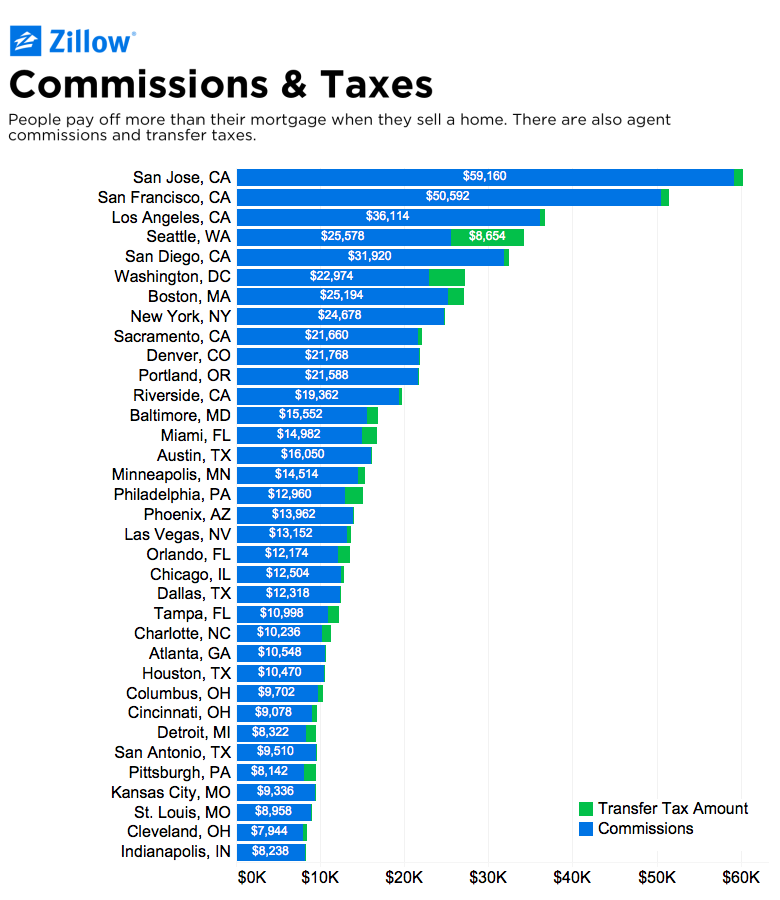Transfer Taxes: A Rude Surprise for Some Home Sellers
These taxes are a commonly overlooked hidden cost to selling, and they vary considerably across markets. For example, transfer taxes on a median-valued home in Chicago total $2,501. If you live just outside the city limits, they're only $313.
When you sell a house, a simple calculation is to subtract your mortgage balance from the sale price and figure that’s your profit, minus odds and ends. But home selling is one of those situations in which the devil is in the odds and ends: For the typical U.S. home, hidden costs total $15,190, according to Zillow and Thumbtack’s Hidden Costs of Selling Analysis.
That includes costs incurred preparing a home for sale – lawn care, new interior paint, house and carpet cleaning, lawn care and staging. But the bulk of that figure — $12,532 — comes from transfer taxes and real estate agent commissions. The area with the highest transfer taxes for a median-valued home is Seattle, where transfer taxes come to $8,654 and total hidden costs total $37,629.
Choosing where to buy
While real estate agents’ commissions tend to be uniform at 6 percent, transfer taxes can make a big difference — and be a big surprise — for people who live in markets that straddle state borders or in cities and counties that levy additional local transfer taxes. For example, transfer taxes on the sale of a median-value home in the city of Chicago total $2,501. Those taxes on a similarly valued house outside the city limits would be only $313. If you’re willing to commute to downtown from about 20 miles away in northwest Indiana (which is still part of the Chicago metro area), transfer taxes drop to zero.
New York City also levies an additional and significant transfer tax. The median transfer tax rate in the state of New York is zero. In New York City, it’s 1.4 percent on homes less than $500,000 and 1.825 percent over that amount.
Similarly, sellers of a median-value home in Washington, D.C., proper pay $4,212 in transfer taxes, while those in nearby Virginia pay $498 — enough of a difference to warrant consideration when you’re shopping for a home.
Interestingly, some states like Washington, Oregon and Delaware that rank among the highest for transfer taxes do not have other common taxes. Washington has no income tax, and Oregon and Delaware have no sales tax on general goods.
Capital gains
If you’re buying in a high-end market, another hidden cost could be capital gains taxes. They affect only sales of the highest-end homes, because sellers who have lived in their homes for two of the past five years (in other words, who sell within three years of moving out) can deduct $500,000 from the profit of their home sale if they’re married and $250,000 if they’re single.
In some markets, where home values are high and moving up fast, the profit on the sale of a median-value home after living there just seven years will sail past those deductibles. In Palo Alto, Calif., where the median home value tops $2.5 million, for example, a married couple would pay $121,400 in capital gains taxes on the sale of a home they bought at the median price ($1.2 million) seven years ago.
There are just 49 of those cities in the country, and all but eight of them are in California. They include big names like Beverly Hills and Malibu, as well as lesser-known places like Medina, Wash., where Bill Gates lives.
Methodology
Transfer taxes were computed using the tax rate for the primary state for each metro area (in cases where metro areas cross one or more state lines) and were applied to the median home value for that area. We assumed the industry standard (6 percent) for real estate agent commissions and applied it to the median home value for each metro area.
Related:

